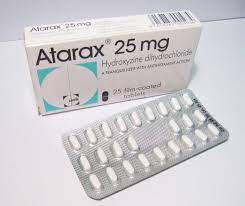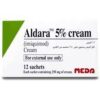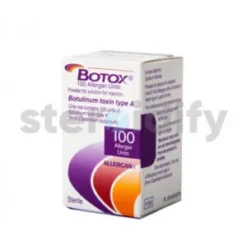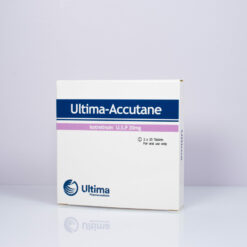ATARAX
67.00$
Atarax (hydroxyzine) is an antihistamine medication that is used to treat a variety of conditions, including anxiety, itching, and allergic reactions. It works by blocking the effects of histamine, a substance that is released by the body in response to allergens or other stimuli.
Atarax is typically taken orally in the form of a tablet or liquid. The recommended dosage for adults and children varies depending on the individual’s age, medical condition, and the specific condition being treated. It’s important to follow the dosage instructions provided by a healthcare professional and to never exceed the recommended dosage.
Common side effects of Atarax include drowsiness, dizziness, and dry mouth. It can also cause more serious side effects, such as allergic reactions or changes in mood or behavior. It’s important to use Atarax only as directed and to talk to a healthcare professional if you experience any serious side effects
What is Atarax used for?
- Relieving itching associated with acute and chronic nettle rash (hives or urticaria) and atopic or contact eczema.
- Anxiety in adults.
How does Atarax work?
Atarax tablets contain the active ingredient hydroxyzine, which is a type of medicine called a sedating antihistamine.
Histamine is a substance produced by the body as part of an allergic reaction. It causes an increase in blood flow to the area of the allergy, and the release of other chemicals that add to the allergic response. All this results in the symptoms of allergic reactions. Histamine is responsible for causing the itching associated with a nettle-type rash and with allergic eczema.
Hydroxyzine blocks histamine receptors and so stops these actions of histamine.
Hydroxyzine enters the brain in significant quantities and causes drowsiness.
The antihistamine action and the fact that it causes drowsiness make hydroxyzine useful for relieving itching associated with nettle rash and allergic eczema. It may be especially helpful for itching that is worse at night. This is often the case in children, who notice itching less during the day when they are active, but are bothered by it at night when they are still and have nothing else to focus on.
Hydroxyzine is also sometimes used in the short-term treatment of anxiety in adults. It produces a calming effect in anxious, tense adults because it causes drowsiness and may suppress activity in certain regions of the central nervous system.
How do I take Atarax?
- The dose of Atarax prescribed and how often to take the medicine depends on the age of the person taking it, the condition being treated and how well it responds. It is important to follow the instructions given by your doctor. These will also be printed on the dispensing label that your pharmacist has put on the packet of medicine.
- Atarax tablets should be taken with a drink of water. They can be taken either with or without food.
- The medicine should be taken for as short a time as possible. Do not exceed the dose prescribed by your doctor.
Important information about Atarax
- This medicine may cause drowsiness. If affected do not drive or operate machinery.
- Don’t drink alcohol while taking this medicine.
- If you are due to have any skin prick or patch tests to diagnose allergies you should stop taking your antihistamines a week before the tests. This is because antihistamines can prevent or lessen the skin reactions that indicate an allergy, and so can make the test results unreliable.
Atarax should be used with caution in:
- Children.
- Elderly people.
- People with decreased liver function (this medicine should be avoided in people with severe liver disease or liver failure).
- People with decreased kidney function and people having dialysis for kidney failure.
- People with conditions that cause difficulty passing urine or urine retention, eg enlarged prostate gland or blockage of the drainage of urine out of the bladder (bladder neck obstruction).
- People with any obstruction or decreased activity in the gut.
- People with raised pressure in the eyeball or glaucoma.
- People with convulsive disorders such as epilepsy.
- People with a condition called myasthenia gravis, which involves abnormal muscle weakness.
- People with an overactive thyroid gland (hyperthyroidism).
- People with breathing problems such as emphysema or bronchitis.
- People with a family history of sudden death at an early age due to a heart problem.
- Dementia.
Possible side effects of Atarax
Medicines and their possible side effects can affect individual people in different ways. The following are some of the side effects that are known to be associated with this medicine. Just because a side effect is stated here does not mean that all people using this medicine will experience that or any side effect.
- Drowsiness.
- Headache.
- Dry mouth.
- Feeling weak, tired, or generally unwell.
- Dizziness.
- Constipation.
- Nausea and vomiting.
- Difficulty sleeping (insomnia).
- Feeling confused or disorientated.
- Agitation.
- Hallucinations.
- Blurred vision.
- Difficulty passing urine (urinary retention).
- Increased heart rate (tachycardia).
- Awareness of your heartbeat (palpitations).
- Irregular heart rhythm.
- Low blood pressure.
- Thickened secretions in the respiratory tract.
- Wheezing or chest tightness.
- Tremor.
- Convulsions.
Related products
Skin Health
Skin Health
Skin Health
Skin Health
Skin Health











